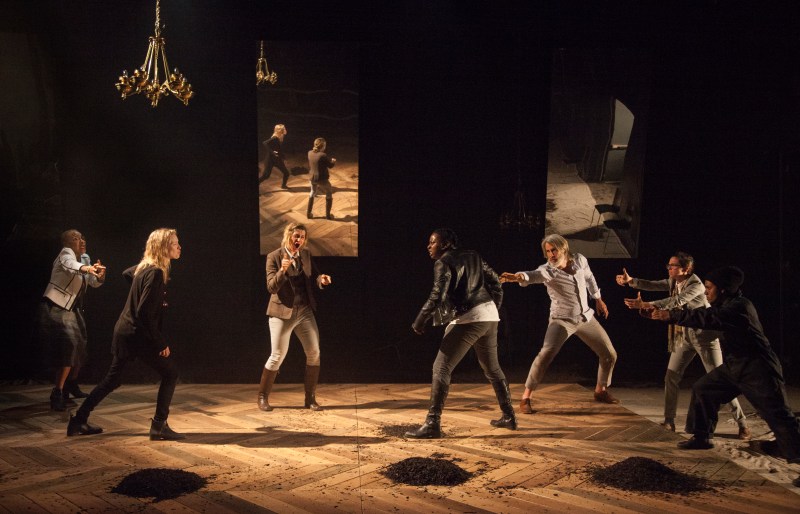On Thursday, Why Not Theatre brought to the Bing Concert Hall a bilingual, cross-cultural and gender-bent take on Shakespeare’s classic tragedy, “Prince Hamlet.” Combining Shakespeare’s original language with American Sign Language (ASL), the production invited hearing, hard-of-hearing and Deaf audiences to rethink traditional notions of story and narrative.
The inclusivity of the show lay not only in its use of ASL, but also its representation from hard-of-hearing cast members. Dawn Jani Birley, who identifies as linguistically and culturally Deaf, played Horatio and acted as the ASL interpreter for scenes between other characters throughout the entire show.
Since Horatio often had a narratorial role in addition to being a character in “Prince Hamlet,” Birley’s context and plot summaries were only comprehensible to those who understood ASL. As a result, accessibility norms were flipped since hearing-only audiences were sometimes at a disadvantage in following the story. I appreciated this change in perspective, as it provided insight into how traditional theater performances fall short for Deaf audiences.
David Ludeke ’22, a hearing student who is learning ASL, told The Daily that he would alternate between listening to the spoken English and watching the ASL signage throughout the play. “In scenes when Horatio used especially complex or abstract signing, I would rely on the English, while at other points I leaned more on the ASL to clarify the Shakespearean dialogue,” Ludeke said.
Why Not Theatre’s director, Ravi Jain, also tweaked the original play to add specific moments that touched on Deaf representation. In one scene, a guard attempts to convey a message to Hamlet. However, the guard must speak to Horatio, who interprets it into ASL for Hamlet. The guard’s building frustration represented how hard-of-hearing people experience conversations in everyday life, particularly the difficulties that come with communicating by proxy, writing or gestures.
In addition, the duel between Hamlet and Laertes was narrated by Horatio through sign language rather than by any of the other four main characters involved (Queen Gertrude, Hamlet, King Claudius and Laertes). Anticipating Deaf audience members’ difficulty of distinguishing between speakers, the character speaking would raise their hand to indicate which perspective Birley was narrating.
Moments like these spoke to Jain’s sincere and thoughtful commitment to the bilingual aspect of his reimagined play. I was also deeply impressed by Birley’s constant presence onstage and her dynamic ability to switch between a character within the play and a liaison between the play itself and the audience.
Jain’s reimagined “Hamlet” also featured a gender-bent cast, including a female Hamlet, female Polonius and male Ophelia, among others.
In a Q&A the day after the show, cast members spoke about how Jain built the play around the actors themselves. By following a gender-blind and color-blind method of casting, he allowed performers to enact roles that would traditionally be unavailable to them.
In this sense, the gender-bending component of the play was not aimed at any particular statement of gender dynamics. King Claudius still referred to Hamlet as “my nephew” and “my son,” and there were no changes to Shakespeare’s use of pronouns nor any of the original language.
In response to questions about the motivations of gender-bent, cross-cultural and bilingual casting, one cast member answered that the namesake of the company — “Why Not?” — could be reason enough.
“This is a provocation and the audience will take away whatever each individual makes of it,” said one cast member. “That’s part of the art.”
Editor’s Note: This article is a review and includes subjective thoughts, opinions and critiques.
